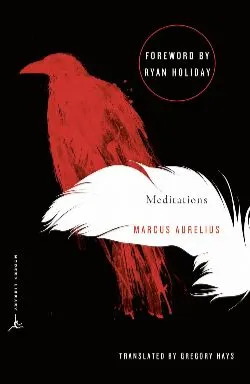
I picked up this book expecting it to be a bit like Seneca’s Letters from a Stoic. It isn’t, in any way, shape, or form. In fact, it’s significantly better. In Seneca’s book, he comes off as a wise man who has lived a lifetime, but is also more than a little bit grumpy and severe. At the same time, Seneca’s work is tarnished somewhat by the knowledge that he essentially sold himself out and tutored Nero. Of course, the end of his life was noble, and he accepted his fate with stoic grace.
Marcus Aurelius, on the other hand, seems like he’s just a guy trying to figure it out. You could hardly tell that he was a Roman emperor through his writings. Instead, he seems just like me.
At the same time, there seems to be a much stronger case that Marcus Aurelius’s work is the canonical text of Stoicism. Hardly a page goes by without discussion of the logos–the “word,” or the flow that orders all of existence in a rational way. All things that happen have always been destined to happen, and it is impossible for things to be other than they are.
Moreover, reflection on death is much more prominent in Marcus Aurelius’s work than Seneca’s. The expression always tossed around is memento mori: “remember, you will die.” All things do at some point, and coming to recognize this offers a sense of liberation. It frees us to do what we must and live lives of virtue and care.
The introduction to my version was especially helpful, as it situates Meditations in the larger context of classical philosophy and gives some guideposts for the text that follows. The editor/translator argues that free will does exist in Stoic thought, to some extent. But, it is limited. He offers an illuminating metaphor: life is like a carriage bound to move forward, and we are like dogs leashed to the carriage. We can run with the carriage, or we can push out in other directions, perhaps trying to dig our feet in. But, if we run too far, we will feel ourselves constrained. If we refuse to move at all, we’ll find ourselves painfully dragged along the hard, cobblestone road.
One argument that I’d be willing to put forth is that the strength of most spiritual traditions is that they demand acceptance of things as they are. In the Abrahamic faiths, this means giving into God: it could be recognition that all things are written by God, it could mean trusting that God will take care of us, or it could be that we must submit to God. It exists in Daoism, too. In fact, the Dao seems an awful lot like the logos, although it lacks the rational order of the latter. Even Nietzsche offers something to submit to: eternal recurrence, which I think Marcus Aurelius would be pleased with.
Marcus Aurelius’s book is therapeutic. It has taken off in social media spaces over the past few years, and rightfully so. It really is a guide for living: it’s life-affirming, forgiving, and brings meaning to the world. Everyone should read it.